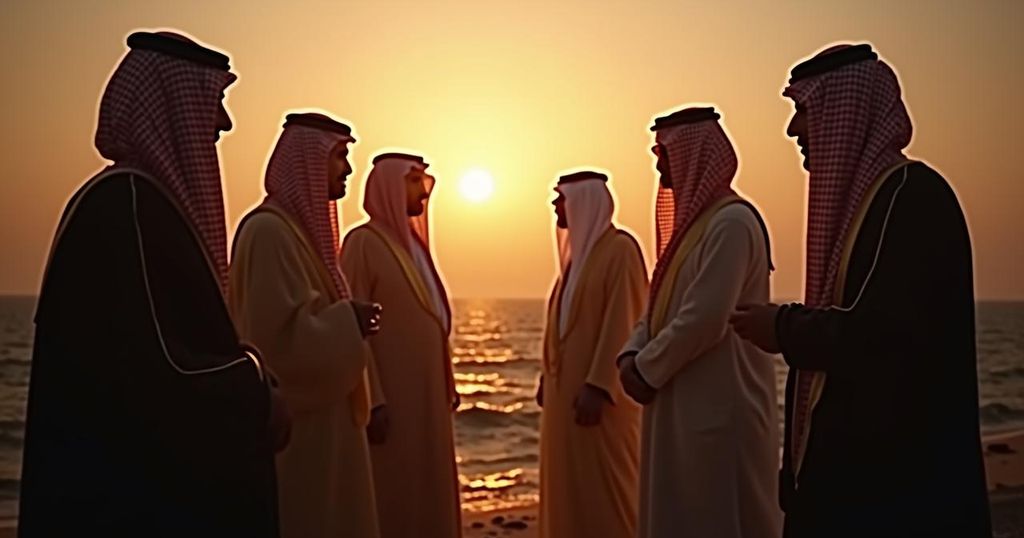Saudi Arabia’s earlier prospects of normalizing relations with Israel are fading as Iran’s foreign minister visits Riyadh to discuss regional conflicts concerning Gaza and Lebanon. Iranian officials are advocating for regional unity against perceived Israeli aggressions. Concurrently, Saudi Arabia’s plausibility of engaging in a security treaty with Israel is increasingly encumbered by demands for Palestinian statehood and warnings of Iranian military retaliation against supportive states.
The prospects for a Saudi-Israeli normalization deal appear to be diminishing as diplomatic engagements shift towards Iran. Recently, Iranian Foreign Minister Abbas Araghchi visited Saudi Arabia to discuss strategies aimed at halting Israel’s military actions in Gaza and Lebanon. He stated, “Our dialogue continues regarding the developments in the region to prevent the shameless crimes of the Zionist regime in Lebanon, in continuation of the crimes in Gaza.” Araghchi also indicated intentions to foster a regional approach to address ongoing conflicts, emphasizing a collective movement to curtail Israeli assaults in the region. Despite the long-standing military and economic alliance between Saudi Arabia and the United States, the kingdom has been exploring a rapprochement with Iran in recent years. The gulf states, including Saudi Arabia, have expressed their commitment to neutrality concerning the escalating tensions between Israel and Iran and have issued warnings about possible consequences for supporters of Israel. Iranian officials have hinted that military responses might target the oil infrastructure of countries supporting Israel. The background context of these developments reflects a precarious balance of power in the Middle East, wherein previous plans for a deal similar to the Abraham Accords—to normalize relations between Saudi Arabia and Israel—had emerged as a crucial objective for the Biden administration. Notably, before hostilities escalated with Hamas’s attack on Israel on October 7, 2023, the negotiations were reportedly nearing completion. However, changing geopolitical dynamics have since shifted priorities, with the Saudis now insisting on a clearly delineated plan for Palestinian statehood before any further discussions materialize. Former National Security Council official Robert Greenway noted the complex interplay of domestic and foreign policy considerations impacting the feasibility of such a deal. He remarked, “I don’t think we were ever really that close,” indicating skepticism about the likelihood of a Saudi-Israeli agreement under the current circumstances. Furthermore, various U.S. lawmakers have explicitly raised concerns regarding Saudi Arabia’s human rights record and the implications of granting nuclear capabilities relevant to security agreements. Despite these challenges, some analysts maintain optimism regarding potential cooperation moving forward. Victoria Coates, former deputy national security adviser, expressed hope for renewed discussions, observing, “From what I’m hearing from both sides, it’s when, not if,” confirming ongoing interest in establishing a more comprehensive framework for security collaboration in the region.
The relationship between Saudi Arabia and Israel has garnered significant attention, particularly surrounding efforts to normalize diplomatic ties akin to the Abraham Accords. Such initiatives aim to stabilize the Middle East and align interests against common threats, notably Iran. However, shifts in regional dynamics, including increased dialogue with Iran, have complicated these relationships, challenging planned negotiations and altering strategic calculations. A focus on addressing humanitarian and political issues, particularly the Palestinian question, has become increasingly urgent in the wake of renewed conflicts.
In conclusion, the recently diminished prospects for a Saudi-Israeli normalization deal reflect a complex geopolitical landscape where regional alliances are being recalibrated. The visit by Iran’s foreign minister signifies a strategic pivot towards Iran as Saudi Arabia reassesses its foreign policy amidst calls for Palestinian statehood. This evolving situation underscores the multilayered challenges facing international diplomacy in the region, compelling stakeholders to reconsider previous commitments and alliances.
Original Source: www.foxnews.com







